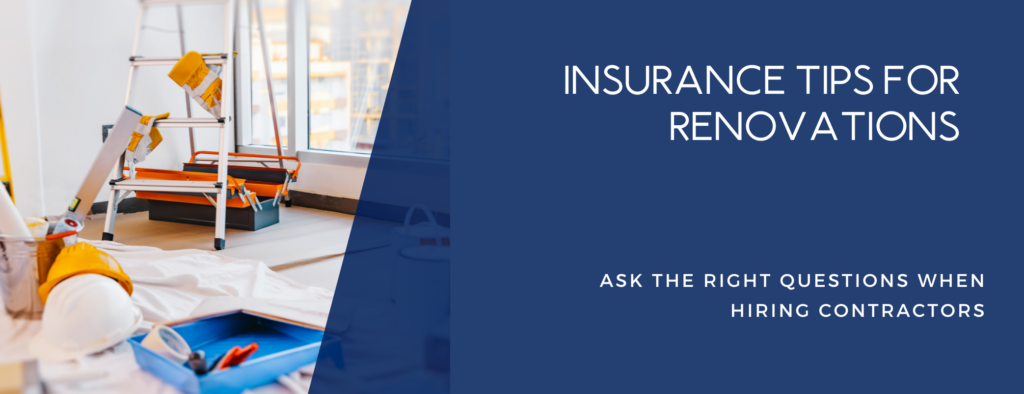In the age of Covid, supply chain issues and rising gas prices, it might seem like a good idea to try to get the best price on your home or business renovations; but hiring a “contractor” who may have the lowest prices, may signal that things might not be above board. That lower price may come at a cost in case of an accident or shoddy workmanship. Before you renovate, review your contractors insurance. Bringing in qualified tradespeople who are licensed and insured is worth their weight in gold – just like the cost of your renovations in 2022. Make sure you contractor has WCB, is a licensed business and has the appropriate contractors insurance.
Due diligence before you hire a contractor
Various contractors from general contractors to roofers, concrete, mason, demolition, tilers landscape companies and more all have a variety of exposures in their trades that are unique to the type of work they do. Roofing is especially dangerous and requires an insurance program that protects the company, the workers and the client.
Take the time to conduct your due diligence. Before you hire a general contractor or any sub-trade it is recommended you do the following:
- Call your own insurance agent to ensure you do have coverage “just in case”. You need to purchase “course of construction” endorsement on your home policy.
- Have a clear outline of what your job or renovation entails and things you want included.
- Get at least two quotes to compare the work, the completion estimate and the price quote.
- References – ask for at least three references from people who have completed the same type of project.
- Insist on a written contract that clearly outlines the scope of work, the time line and the payment schedule. Include a 10% holdback that is only paid upon agreement that the job has been completed to satisfaction.
- Ask for proof of Worksafe BC certification and check that the company is in good standing.
- Review insurance – ask for a copy of the most current insurance policy and make sure you are comfortable with the amount of liability coverage.
- Social validation – look at a combination of how their online reviews are coupled with Better Business Bureau and are they in good standing with their respective industry associations.
Types of contractors insurance
In the world of construction there is a variety of insurance coverages. At the bare minimum the contractor should have the following:
Work Safe BC: This insurance covers workers who may get injured on the job.
General Liability Insurance (CGL): In the event of a contractor flaw, this insurance is crucial.
In addition to the basic insurance policies it is recommended that contractors also have additional coverage as there are common exclusions to CGL insurance for contractors.
Umbrella or excess liability: this policy provides protection against losses when a CGL liability insurance policy limits are inadequate or cannot cover all the expenses. Essentially, it picks up where other liability coverage stops, providing extra protection against suits from third parties for bodily injury and/or property damage.
Surety bonds: these bonds can be a performance bond to guarantee completion of the job, but labour and material bonds are also available. A bid bond is provided by a licensed Canadian surety provider
Wrap up insurance: a centralized insurance and loss control programs intended to protect the project owner, general contractor and subcontractors under a single insurance policy for the construction project. Wrap-up policies are typically placed for a fixed term for the construction period of a project, plus an additional number of years after completion to deal with any issues arising during the warranty period.
Risks of hiring uninsured contractors
The number one thing to remember is that if a contractor does not have the appropriate insurance you or your business can be held liable for everything that happens on your property. Does you home insurance policy or business policy have the coverage to cover a law suit that could be in the millions of dollars?
Liability for injuries of workers
The risk is higher in certain sub-trades such as roofing, stucco, arborists – any one who works in a high off the ground environments. These workers are exposed to a higher percentage of risk of injury on the job. Although, WorkSafe BC and most companies have excellent training and safety requirements, incidents do happen. When a worker suffers an injury, a licensed company has the backing of WorkSafe BC and the insurance will kick in to cover medical costs and other damages. For example if your roofing company has a worker fall from a ladder or nail his hand, you could be liable for the medical costs and long term disability if the company you employed is not properly insured.

Liability for damages
Construction jobs are complex and sub-trades have to be careful not to create cascading problems on a job site or renovation. For example a roofer damages pipe, soffits, HVAC or electrical equipment. One of the most common property damages in renovations occurs when a plumber breaks a pipe causing water damage. If you live in a condo this can become incredibly complicated on what insurance policy (contractor, owner, strata) will cover the various damages.
Given all of those risks, take the time to review your contractors insurance. Not having professional insurance should be a deal breaker in your decision to hire a contractor. In some cases if you knowingly hire an uninsured contractor, your own policy may be void. Having the proper credentials exhibits credibility and quality. If a trade or contractor doesn’t have the proper coverage it should be a red flag. Take the quality company over price every time.
Resources for review your contractors insurance:
Worksafe BC: Learn about employers responsibly.
Reliance Insurance: Tell your insurance broker that you are renovating




Reliance Insurance proudly serves
Burnaby and the Vancouver area